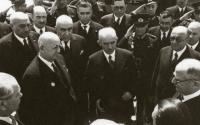Published on Friday, January 10, 2003 by the lndependent/UKby Adrian Hamilton
To listen to US politicians or to read American columnists these days is rather like eavesdropping on a Colonial Office conversation in the late 19th century. The hand sweeps across the world's map marking the natives.
Europe: a fine civilization but a people grown overprotected. Must brace up with fewer social benefits and more armaments. Japan (wry smile here): once quite challenging but now sunk in a slough of inaction. Africa: a benighted people who have brought it on themselves. And the Arabs? Failed the challenge of modernity. We'll need not just to remove a few bad regimes but also occupy Baghdad until we can spread the word of democracy and capitalism.
Extraordinary to say, but there seem to be a substantial number of people in Washington who believe this patronizing drivel. Worse they are finding an echo over here, not just with a few fogies who declare how much better Africa would be if it were still ruled by the British, but with people who believe America should take up Britain's imperial role.
No less a figure than the historian Niall Ferguson started a television series last night in which he argues the case for a revisionist view of the British Empire.
Ferguson is a historian who has done for the British monied class what JH Plumb did for the landed classes, with similar awed devotion, in books on the Rothschilds and The Cash Nexus. In his world, the British Empire not only did good for its subject peoples by bringing them the benefit of open trade, immigrant labour and the English language, it also acted as precursor of the global economics that we see today. America is our natural successor, if only it would learn the lesson that these things cannot be left to themselves. They have to be imposed and ruled.
Now there is undoubtedly a case for a revisionist view of the imperial experience. It is already under way in the case of the much despised Ottoman Empire and the Portuguese. Efforts to cast a better light on the Spanish Empire have proved more difficult because of the scale of blood and plunder that has to be explained away.
The British, according to the revisionists, have too long allowed themselves to be portrayed in the oppressor's light. As with the Roman Empire, you can argue that peace brought prosperity, richer cities and larger populations. Yet you still need some insouciance, or an extraordinary degree of anglo-centricity, to take the Victorian view that Britain's imperial history was a steady march towards bringing civilization to the natives and progress to the world.
The British devotion to free trade may impress Mr Ferguson, but it did not feel quite that benign to Indian peasants paying the salt tax, Indian textile workers wiped out by the Lancashire cotton mills, the Chinese forced to open their markets to the opium business or to those who suffered from the panoply of imperial preferences.
If Britain managed to rule half the globe with relatively few resources, it was through the use of particular local groups such as the Bengalis in India or the Christians in Palestine who were left high and dry on independence.
The appalling cost of partition in India and the suppression of tribal rights throughout Africa, the after effects of dividing Palestine and the distortions of economies through imperial preference, cannot simply be written off as if they never happened or have no relevance today.
These can be counter-balanced by the good effects of stability, education, technical investment and the introduction of parliamentary democracy before decolonization. But you can't pretend that there wasn't, and isn't, a difference in the way we see Empire as the rulers and how the subjugated saw our rule as its servants.
Yet this is exactly what Professor Ferguson does. His is a history that is not so much revisionist as recidivist. Back to seeing the world through the eyes of the victors, where the subjects are anonymous natives without cultures or feelings or aspirations of their own other than what they are handed from above. History as the march of white-man's progress. Which is sad, not least because one of the few admirable qualities of the British Empire was the number of people prepared to learn about native cultures and to understand them in their own right.
As a means of understanding, let alone determining, the present, it is woefully one-sided and wilfully ignorant. Free trade has indeed become the order of our day, for better or worse depending on which part of the heap you find yourself in. But empire, as Professor Ferguson explicitly accepts, requires a degree of rule and imposition. And you do not impose order, however well intentioned, without distorting realities on the ground.
Britain left a world perhaps better educated and possibly more prosperous in parts. But it was also a world in which tribal or religious divisions were suppressed but not removed and in which institutions were imposed from without. Quite simply we cut and ran, leaving behind a legacy which the world is still trying to cope with.
You could say the same for the Cold War. It froze conflicts but it did not remove them. When it ended, the underlying world re-emerged with all its old complexity and tensions. It needs help. It needs understanding. What it does not need is a new Empire.






